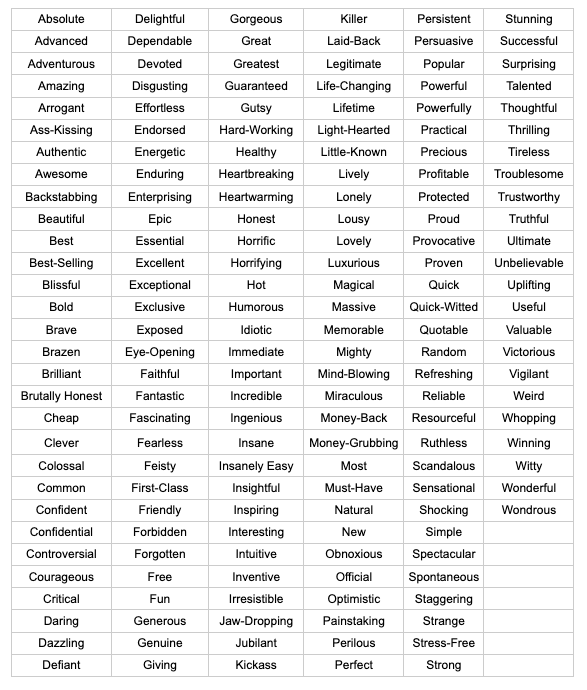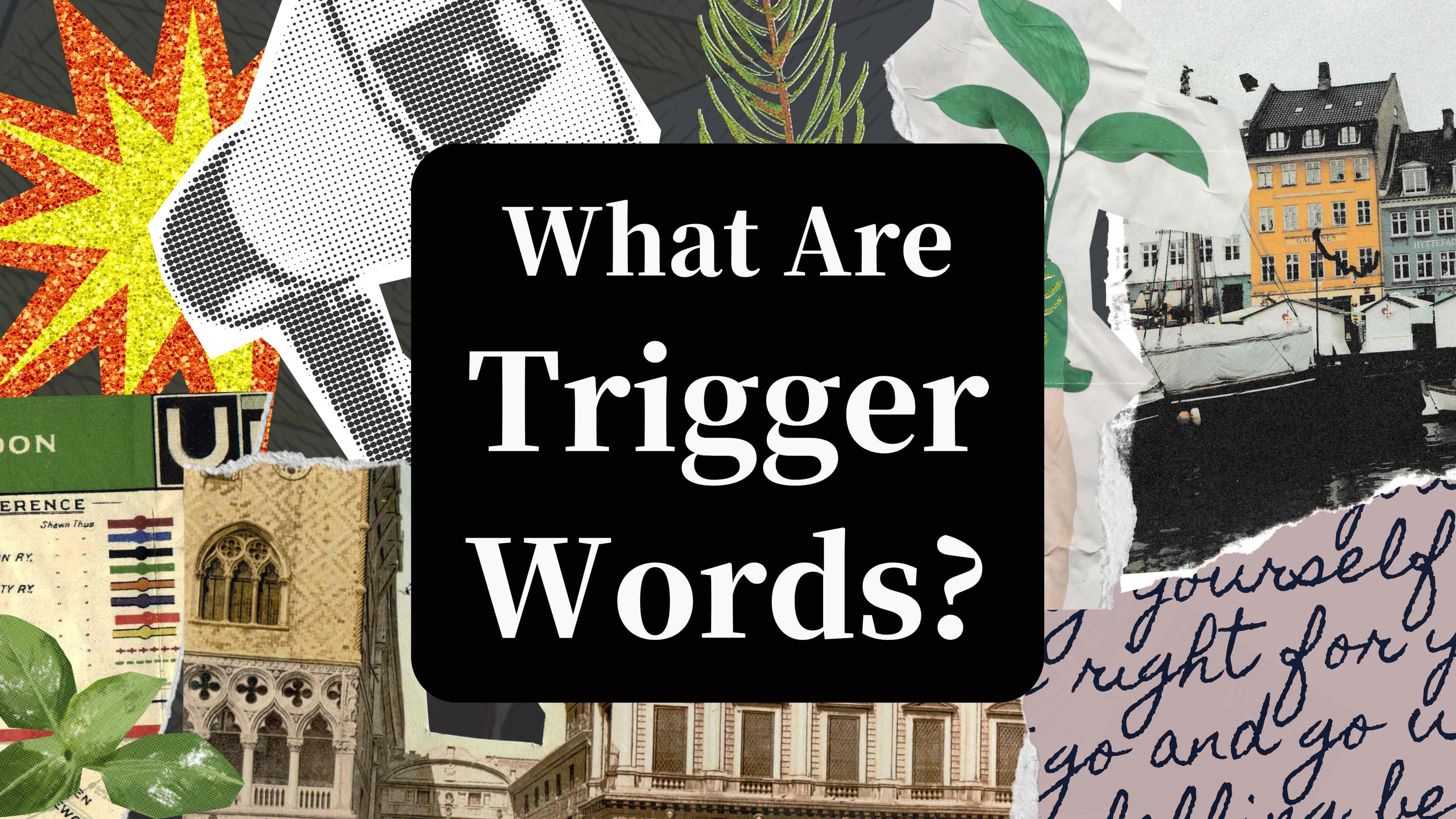For users to stop the scroll long enough to hear or read our message, we need to hook them with the right words and provide the right context.
Words that take your online writing from drab to fab are called trigger words. When a trigger word is used correctly, your readers are more inspired to take action.
Here’s the good news: you don’t need to be a great writer to produce good writing. You simply need to know about and learn how to use emotional trigger words, and, more specifically, the right trigger words to develop hope and personal rapport with readers.
Let’s jump in to what emotional trigger words are, how they are used to evoke emotional response, and how you can start leveraging them to boost engagement from your words and phrases.
What Are Trigger Words?
Trigger words and phrases evoke positive or negative emotions in readers. Most listeners and readers will initially be hooked by trigger words as they scroll the internet.
In most cases, whether it be content writing, copywriting, pitching articles to media, or breezy social media captions, trigger words hook a person and give them a visceral reminder of why your content feels relevant to them. When consuming your content leaves readers in a more positive emotional state, they have a better sense of who you are and develop a deeper connection with you, boosting engagement.
The Psychology of Trigger Words
To understand how trigger words work, it helps to know that the human brain lights up in one of two ways. Good writers know how to engage both.
First, you have the logical brain. This area of the brain is called the frontal lobe, and it’s responsible for information processing, decision making, and reason. The logical brain seeks out simplicity and understanding, which is why clear, concise writing or speaking tends to perform better than flowery, complex language. As soon as a significant portion of the logical brain becomes too taxed, we feel overwhelmed and shut down.
Then you have the emotional brain. This area of your brain is called the limbic system, and also processes sensory information, which is why you sometimes associate certain sights, sounds, or smells with certain feelings. The emotional brain is powerful, and when emotions are activated, it will temporarily override the functioning of your logical brain.
The logical brain does eventually catch up. But when the emotional or sensory input is strong, our emotional brain can run the show for quite a long time — it’s human nature!
Be careful with trying to juice the emotional brain; it becomes cringe-y when a writer is trying too hard to twist the knife.
A general rule in online writing is that we want readers to stick with us for as long as possible. We want them to read our content so we can help them, soothe them, or influence them to take a specific action. Trigger words help us activate the emotional brain of our readers and take action.
Examples of Positive and Negative Trigger Words
Positive trigger words help your reader connect with the pleasant outcomes they’ll get as a result of taking action. In some circles, this copywriting strategy is referred to as the dream sequence. By painting a vivid picture of what the outcome could look and feel like, you help your reader connect to the feelings that are valuable to them.
In contrast, when you leverage negative trigger words, the journey you are taking your readers on is called a dread sequence. If you don’t act, there will be unpleasant outcomes or consequences as a result. Negative trigger words help to drive up these emotions.
172 Trigger Words to Pump Up Your Writing
Often, seeing an example of a trigger word or phrase is the best way to get an idea of what to post. Here’s a chart of some popular emotional trigger words to get your gears turning.

The positive trigger words
Delightful, Gorgeous, Great, Dependable, Laid-Back, Successful, Adventurous, Devoted, Greatest, Legitimate, Popular, Surprising, Amazing, Guaranteed, Thoughtful, Hard-Working, Light-Hearted, Thrilling, Authentic, Awesome, Heartwarming, Profitable, Protected, Trustworthy, Beautiful, Lively, Proud, Truthful, Best, Essential, Lovely, Best-Selling, Excellent, Luxurious, Proven, Enterprising, Blissful, Uplifting, Useful, Brave, Valuable, Victorious, Brilliant, Faithful, Refreshing, Vigilant, Fantastic, Incredible, Miraculous, Reliable, Wonderful, Confident, Friendly, Inspiring, First-Class, Insightful, Must-Have, Resourceful, Clever, Fearless, Money-Back, Winning, Insanely Easy, Most, Witty, Wondrous, Spectacular, Courageous, Free, Inventive, Fun, Irresistible, Optimistic, Generous, Dazzling, Genuine, Jubilant, Stress-Free, Giving, Kickass, Perfect, Strong.
The negative trigger words
Troublesome, Backstabbing, Horrific, Idiotic, Disgusting, Ass-Kissing, Heartbreaking, Lonely, Lousy, Perilous, Painstaking, Money-Grubbing, Ruthless, Scandalous, Obnoxious, Brutally Honest, Horrifying, Critical.
Flexible trigger words
Killer, Advanced, Persuasive, Persistent, Stunning, Absolute, Life-Changing, Powerful, Talented, Arrogant, Effortless, Gutsy, Lifetime, Powerfully, Endorsed, Practical, Energetic, Healthy, Little-Known, Precious, Tireless, Enduring, Exceptional, Hot, Epic, Honest, Provocative, Ultimate, Unbelievable, Magical, Quick, Bold, Exclusive, Humorous, Massive, Quick-Witted, Exposed, Memorable, Quotable, Brazen, Eye-Opening, Immediate, Mighty, Random, Important, Mind-Blowing, Intuitive, Official, Spontaneous, Staggering, Daring, Jaw-Dropping, Strange, Defiant, Weird, Cheap, Fascinating, Ingenious, Whopping, Insane, Colossal, Feisty, Common, Sensational, Natural, Shocking, Confidential, Forbidden, Interesting, New, Simple, Controversial, Forgotten.
The Best Places to Use Trigger Words
You don’t want to use trigger words everywhere all the time, and some types or phrases are more suitable than others for using trigger words. That being said, the right trigger word can boost desire and create instant gratification. Here are a few things to keep in mind regarding placement.
Headlines
Headlines are everything in writing, and a great headline uses the right words to evoke emotion. In the media, we workshop headlines every single day to ensure we have the most accurate, clear, and attention-grabbing headline for any given story. You’ve worked to put together a blog post or article; if the headline is sloppy, no one will ever see your thoughtful content.
Headlines require brevity, and every letter counts. Try to strike a balance between giving detail and not overdoing it.
Email subject lines
Email subject lines require even more brevity. Most email subscribers read their email on their phone. Email subject lines get cut off after as few as 55 characters, so it’s important that you get to the point or punchline immediately. 55 characters is six to ten words, for reference.
Social media previews
If you write a longer social media caption, social media feeds will not show your entire caption. Twitter, LinkedIn, Instagram, Facebook… they’re all the same. What you write in those first few lines determines whether people will care enough to click “read more” and continue to consume your content.
Generally, working trigger words into the front of headlines and other top-of-funnel assets is a smart move.
FAQs About Copywriting and Trigger Words
Is it slimy or sleazy to use trigger words?
Overusing trigger words can make you seem less trustworthy. But for most of us, we want people to read the words we write because we want to inform, inspire, or entertain them. Think of trigger words as a tool that can help project social proof on your landing pages and pop ups, helping you to attract more visitors and make more sales.
The key with emotional trigger words is to help our readers process emotion.
What if I’m not sure how I want my readers to feel?
Sounds like there is some research to do! What are you trying to accomplish with your content? What’s the bigger picture? How does your writing change the way people feel or think about the world? Think about a lot of your readers’ pain points or desires before you try to create your next ultimate guide, course, or limited time offer. Otherwise, you might forget who you’re writing for, and your content will fall flat.
I’m not a good writer, will trigger words help me?
Trigger words can make all the difference when it comes to bringing more zing into your writing. Again, they’re a tool. Imagine them as being like a spice or a seasoning. Experiment to see which types of trigger words or other descriptive words get a warm reception online.
*
Trigger words are an easy solution to overcome writer’s block, and they’re a best-kept secret of consistent online writers. Consider using some of them the next time you press publish and see what happens.
Thanks For Reading 🙏🏼
Keep up the momentum with one or more of these next steps:
📣 Share this post with your network or a friend. Sharing helps spread the word, and posts are formatted to be both easy to read and easy to curate – you'll look savvy and informed.
📲 Hang out with me on another platform. I'm active on Medium, Instagram, and LinkedIn – if you're on any of those, say hello.
📬 Sign up for my free email list. This is where my best, most exclusive and most valuable content gets published. Use any of the signup boxes on the site.
🏕 Up your writing game: Camp Wordsmith is a free online resources portal all about writing and media. Get instant access to resources and templates guaranteed to make your marketing hustle faster, better, easier, and more fun. Sign up for free here.
📊 Hire me for consulting. I provide 1-on-1 consultations through my company, Hefty Media Group. We're a certified diversity supplier with the National Gay & Lesbian Chamber of Commerce. Learn more here.


